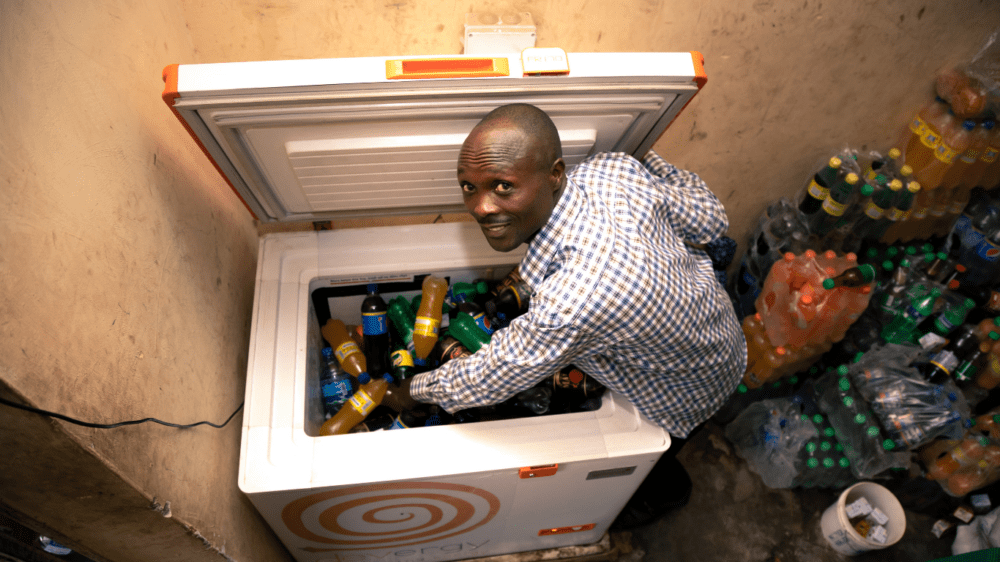Groundbreaking 60 Decibels and Efficiency for Access Study Reveals Key Long-Term Benefits of Off-Grid Refrigerators for Low-Income Users
Refrigerators contribute to various Sustainable Development Goals, from improving human health and productivity to reducing the domestic burden of women and children, who are usually responsible for food gathering and preparation.

Refrigerators have the potential to unlock an array of social and economic benefits for people living in off- and weak-grid areas. They contribute to various Sustainable Development Goals, from improving human health and productivity to reducing the domestic burden of women and children, who are usually responsible for food gathering and preparation.
To better understand consumers’ experiences and the impacts of off-grid refrigerators, 60 Decibels and Efficiency for Access launched a multi-year study. The analysis revealed that 84% of the respondents were owning a refrigerator for the first time. 79% of respondents indicated that they use their off-grid refrigerators for income-generating activities. 45% of the respondents said they would like to purchase an upgraded or additional off-grid refrigerator. A typical customer was male, 39-years-old and living in a household with five other occupants.
The study analysed responses from 603 participants in Kenya (49%), Uganda (49%) and Tanzania (2%), all customers of six Global LEAP Awards Result-based Financing Facility beneficiaries: Devergy, Global Ice Tec, M-KOPA, SolarNow, SUNami Solar and Ultratec.
“This is the first report of its kind, which amplifies end-user experiences and the impact off-grid refrigerators are having in their lives, through their voices. Hearing about what customers most value, what is working well, and what challenges they face using these products provides actionable insights for companies and funders looking to design and deliver refrigeration services across Africa”, said Kat Harrison, Director at 60 Decibels.
Impact on Consumers
Selling cold drinks and the prospect of boosting their businesses were the top two motivators for purchasing an off-grid refrigerator. 82% of customers said they consider their off-grid refrigerator ‘very good’ or ‘good’ value for money. Top challenges cited were issues with product parts, poor battery and poor payment method. This study explored impacts on the quality of life, market visits, cooking, diet and businesses. Increased income and business growth were the positive top outcomes, experienced by 72% of off-grid refrigerator customers who reported that the refrigerator improved their quality of life.
One consumer surveyed said, “The refrigerator has made it easy for me to earn more money since I can sell more drinks in a month. This has helped me to raise more capital for my business.” Another reported, “Ever since I acquired this refrigerator, I have been able to expand my business by reinvesting the money I earn. This refrigerator has made it easy for me to make more money than I expected.”
“Listening to people’s feedback is critical to understand whether our efforts to support the uptake of solar powered refrigerators is translating into improved lives. Most people who purchase a solar refrigerator use it in a place of business, demonstrating that entrepreneurs view refrigerators as an investment that can support improved livelihoods. However, over a quarter of customers experienced challenges with their refrigerators, providing evidence that the work we are doing under Efficiency for Access to support robust quality assurance frameworks for solar powered appliances is needed“, said Jenny Corry Smith, Chief of Programs at CLASP.
Affordability
However, affordability of off-grid refrigerators is still a major impediment to access. 48% of consumers said that their solar product repayments were a burden, with 13% saying it is a ‘heavy burden’. Further, 50% of consumers said that they had to make unacceptable sacrifices in order to make repayments. 42% of those who had made unacceptable sacrifices had made them for other reasons before purchasing the off-grid refrigerator.
This assessment is the fourth in a series by 60 Decibels and Efficiency for Access studying the impact and benefits of off-grid appliances and productive use equipment to consumers. Previous studies have covered solar water pumps, electric pressure cookers and solar televisions. For more information, please download the Uses and Impacts of Off-Grid Refrigerators report and follow us on Twitter for regular updates.